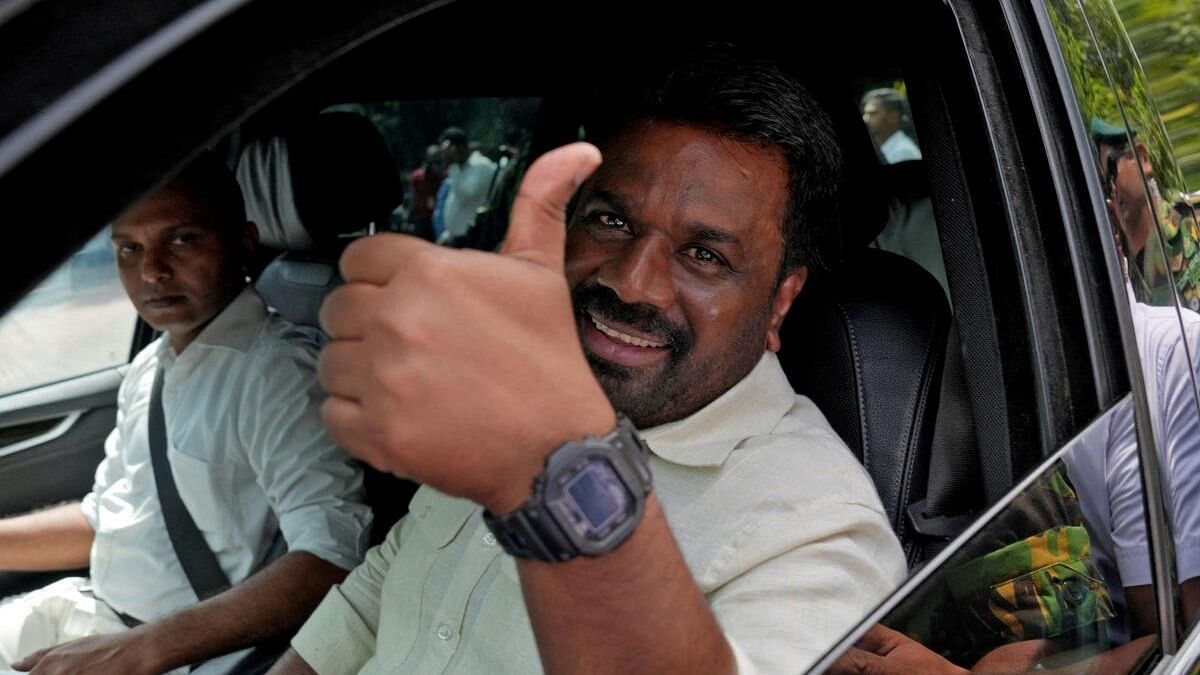
Sri Lanka's President Anura Kumara Dissanayake
Credit: Reuters Photo
The recently concluded Sri Lankan parliamentary elections saw a big win for the National People’s Power (NPP) coalition which secured 159 out of the 225 seats.
As per the electoral system of Sri Lanka, of the 225 parliament members, 196 are elected directly from 22 multi-member electoral districts and the remaining 29 allotted as per the overall voting percentage obtained by parties.
This is the first time a single entity is securing two-thirds majority since the introduction of the proportional representation electoral system in 1978. NPP gained majority in every electoral district except in Batticaloa and trounced traditional parties such as UNP, SLPP and SLFP.
A non-Tamil party winning in the minorities-dominated north and east is unprecedented. How do we discern this decisive mandate?
Firstly, people wanted a change from the style of governance practised by the traditional parties that have been in power since independence. A fresh look at the issues, especially the economic crisis, was due.
President Anura Kumara Dissanayake called for parliamentary polls soon after assuming office by justifying: “there is no point continuing with a parliament that is not in line with what the people want.” He only had three seats in the outgoing parliament. People responded to his call by entrusting both the executive and legislature to him.
Secondly, this is a vote that transcends ethnic considerations. The minorities, especially, wanted the government to address immediate livelihood issues like unemployment, household debt, inflation, and scarcity of essentials, than finalise a political settlement to the ethnic issue.
This explains NPP’s unexpected wins in Jaffna, Vanni, and Ampara. Apart from the promises of clean politics and accountability, liberal welfare schemes in the NPP manifesto were attractive. The party was also at the forefront of the Aragalaya protests that unseated the Rajapaksas who were considered responsible for the economic crisis. Anura has also been acting on negotiating “with relevant creditors to expedite the process and secure necessary debt relief.”
Thirdly, the NPP has been widening its support base. Comprising 21 groups of civil society organisations, trade unions, youth and women’s groups, the NPP is more a social coalition than a political conglomeration. People saw this as an inclusive upgrade to the party which leads the coalition – Janatha Vimukthi Peramuna (JVP), the Sinhala nationalist, anti-minority party that led two insurrections (1971 and 1987-89).
On the other hand, the two traditional big parties – UNP and SLFP – were factionalised and weak. Only Samagi Jana Balawegaya (SJB), led by Sajith Premadasa, is in a position to sit in the opposition with 40 seats. Traditional voters of Tamil and Muslim political parties either stayed away from the polls or voted for the NPP.
Making the mandate count
That a single entity could get two-thirds majority in the proportional representation system is a clear sign – people wanted the executive and the legislature to focus on the issues in hand.
This is also the first time that the incumbent president has the numbers to pass a legislation in parliament without needing to rely on allies or coalition partners. JVP wanted to bring a change through insurrection at one point; now, it has a chance to bring change through democratic means.
The historic mandate is an opportunity for President Anura to implement his “commitment to making a difference.” Although leftist by core, Anura seems to understand the inevitability of an open economy. The President has already indicated that the “change we seek involves many steps that will take time.” People will wait, but not for too long.
The new dispensation will need to conduct long-overdue elections for provincial councils. Although JVP has traditionally opposed the provincial council system, it now wishes to continue with it until a “lasting solution” to the ethnic issue is found.
Anura repeatedly mentioned “unity” in his maiden speech to the nation – “We are launching a permanent programme to build a unified Sri Lankan nation that respects diversity, fully ending the era of division based on race, religion, class, and caste.” However, a “unified Sri Lankan nation” should not disregard the rights of minority communities.
There has been talk about abolishing the executive presidency but without any follow-through. Will the NPP succeed? The focus now should be on the use of power rather than power itself. The promises can be fulfilled if energies are focussed on development.
“There is a change in Sri Lanka’s political culture that started in September, which must continue,” the president said referring to his victory. With a decisive mandate, the nation has placed immense trust on a new leader; they will be looking at him closely as he prepares the road to recovery, and beyond.
(The writer is Professor and Director, Centre for East Asian Studies, Christ deemed to be University, Bengaluru)